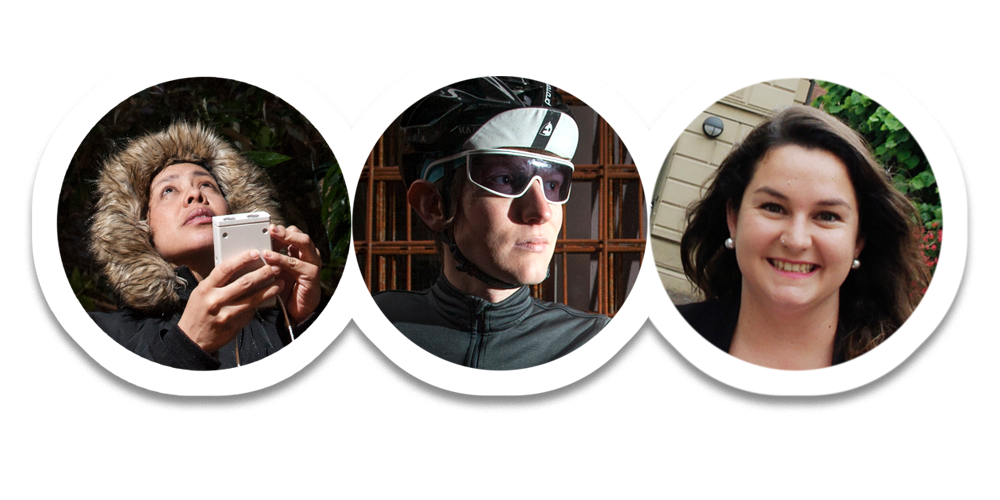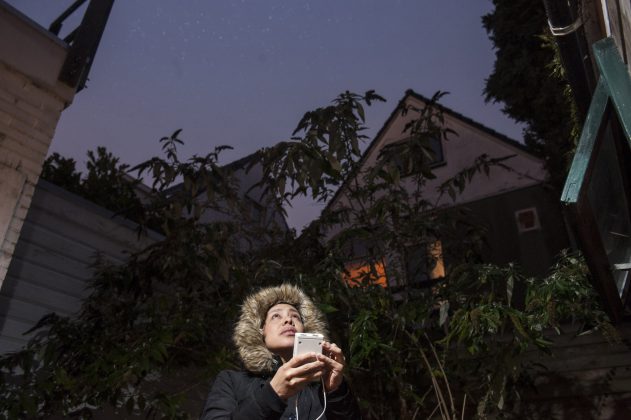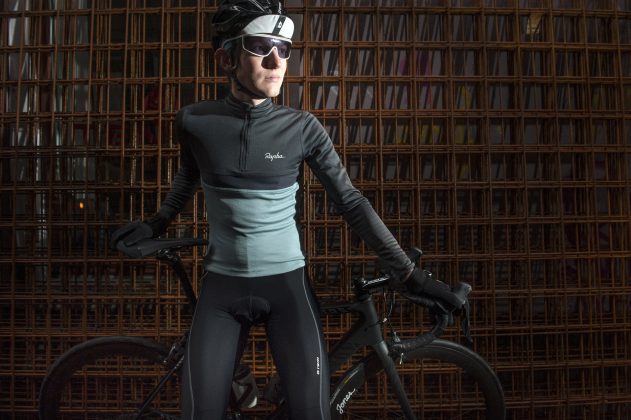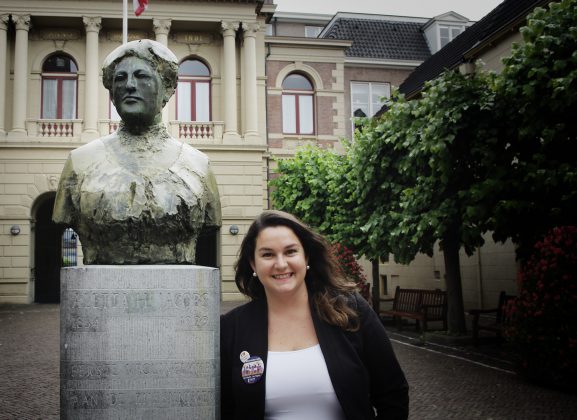Hidden talent
The secret life of PhD's
Meet Angelica, the academic
Angelica Caiza Villegas was born in the capital of Ecuador – Quito, surrounded by mountains and volcanoes. In Ecuador, she worked as a student researcher on different projects studying humpback whales, river dolphins, otters, and caimans. Angelica moved to the Netherlands in 2013 and obtained a research master degree at the RUG in 2015. She is currently busy with her PhD in animal geographies and human – animal relationships under the supervision of Bettina van Hoven and is a part of a Groningen-based bat-watch group.
In the office, Angelica is determined, meticulous, and an analytical thinker. Her desk is located next to a big window, and her vision board full of pictures of animals.
Her interest in new ways of wildlife conservation science lies in the connection with social geography studies. ‘I think that nature conservation can benefit a lot from the social sciences. How people perceive animals in their geographical context have a direct impact on the survival of many animal species’, Angelica explains eagerly. ‘I think exploring human-animal relationships can contribute to a better understating of how humans and animals can co-exist and wildlife conservation programs can be more effective.’
At this moment, Angelica is focused on successfully finishing her doctoral program and she plans to expand her research area to more wildlife species, which exist in urban areas.
She describes her academic persona as a hybrid. ‘On the one hand, I’m a biologist and my research interest is the animal world. But I’m also a social scientist, which is a completely different world’, she says. One of her research subjects include the explorations of the ways, in which societies work. ‘So as an academic hybrid I’m trying to connect the two.’
Her biggest challenges are related with self-discipline and time management. ‘As a PhD candidate, I have obligations and try to fulfill them in the best way possible’, she says. The stress is neutralized because she gets to do what she really loves.
Meet Angelica, the bat-woman
When the night comes, Angelica changes completely. As a bat-woman, she is curious and not afraid to roam dark, spooky forests. ‘I love bats! They are extraordinary animals with special biological and ecological features’, she says. ‘I think bats have been misunderstood. People perceive them as dangerous or ugly.’
Angelica is part of a Groningen-based group, which monitors the behavior of bats in the province. ‘Finding people who share the same interests and organize activities in this subject area is just amazing.’
She enjoys walking at night, either in Groningen or in the jungle in the Amazon. ‘I love to listen to their sounds or catch them to see them up close. I like to play the ‘detective’: to find where they live or what they eat’, she says. Angelica likes to talk about bats and teach people about them. ‘I like to find items with bat figures, toys, cards, places etc. So as a bat-woman I am trying to understand the bat world in order to enjoy them more.’
She tries to keep herself up to date in several areas such as software and programs to analyze bat sounds. ‘And of course to grab all the opportunities to participate bat-research, if I have some extra time.’
Meet Steven, the academic
Steven Willemsen was born in Eindhoven, a picturesque town in the south of the Netherlands. He went to school in Helmond, where he spent his time listening to or playing music and reading. Steven graduated from the literary and cultural studies research master and continued as a PhD candidate at the RUG, wrapping up his own research project on applying cognitive approaches to the arts. On top of that he cycles. With a vengeance.
In the office, which Steven shares with other PhD candidates, he is calm, focused, and a critical thinker. ‘My main research interest is in applying cognitive approaches to the arts: drawing on ideas from cognitive sciences to understand how films or stories ‘work’ on us as spectators’, says Steven. His research investigates film narratives that are non-chronological, looping, or paradoxical. ‘Why would anyone enjoy a film that confuses them?’
He is attracted to the aesthetic experience of artworks, which are able to give us intense and life-like experiences. ‘Understanding how films tap into our cognitive and perceptual systems to involve us perceptually and emotionally, and on a bodily level, is very exciting to me – also because I believe such aesthetic experiences are something very elementary to being human’, says Steven.
He is also quite a David Lynch fan. ‘I am drawn to films like Mulholland Drive, or perplexing art films like Fellini’s 8½. But it is also interesting to see how complex storytelling has become so widespread in film culture today with ‘puzzle’ films like Memento’, adds Steven.
Meet Steven, the competitive cyclist
However, the same guy that likes talking about modernist, black and white art-house cinema also races a bike in tight, multi-colored lycra. He comes from a cycling-minded family and his brother, father, and uncle are all cyclist. ‘And of course, I grew up watching major races like the Tour de France and Paris-Roubaix’, he says.
So after some years of being the typical student involved with smoking and drinking, and generally other life priorities, Steven returned to cycling. His fascination with the sport has something to do with its ‘narrative’ quality. ‘What I always loved about cycling is that more than any other sport, it constantly creates stories: about the races, the landscapes, routes, the history, and so on. It’s a world of its own, really.’
In 2016, Steven won the Dutch national collegiate championship, which he took as a good reason to get into racing more structurally. ‘I entered on amateur level this season, in California where I was living in the winter of 2016-2017, and then in Groningen, where I won some of the prominent races on the local calendar, including two stages in the Wielermeerdaagse, and the Omloop Bronneger Bult’, says Steven.
He is now making a mid-season switch to a team that races on the national elite level. ‘The races will be longer and harder, and I’ll sometimes be competing with semi-professionals as well, but it will be great to test myself in that field.’
Both being a cyclist and an academic involves persistence, and perhaps a slight degree of obsessiveness, he says. However, cycling works is also the perfect counterpart to his academic job. ‘It can be physically and mentally demanding, but the racing is just pure flow, focus and adrenaline. It is great to be able to be immersed in something purely sensuous’, he says. ‘Also, when you have had a bad day in research or teaching, or when things are just not working out, getting out for a training ride makes for a perfect mental reset.’
Fitting it all together feels like a bit of a weekly puzzle, but as long as it is working out, it makes for a pretty balanced life, explains Steven. ‘Ultimately, in both cases, I guess that doing one prevents me from becoming obsessive over the other’.
Meet Lucía, the academic
Lucía Berro Pizzarossa grew up in the suburban area of a small village called Bella Unión in the Uruguayan countryside. When she was eighteen, she moved to Montevideo, the capital of Uruguay, to pursue a career in law and international relations. She obtained a master’s degree in law from Oxford University and in November 2015 moved to Groningen to start her PhD. Lucía works with a number of non-profit organizations and dedicates what free time she has left to the fight for women’s rights and health.
Lucía found inspiration as a freshman, volunteering at clinics that provide legal advice to underprivileged people. She decided to peruse this topic throughout her academic career. In Groningen, she is researching the interaction between gender stereotypes and giving critical interpretations of the policy-making procedures and legal practices. Her work extends to gender and diversity in academic settings.
‘Groningen offered me the academic environment I was looking for—more policy oriented and centred in social justice’, says Lucía. She believes that academic knowledge should not be locked away in an ‘ivory tower’, detached from social issues. ‘I decided to use my academic knowledge to craft innovative ideas to address the barriers of access that hinder the enjoyment of sexual and reproductive rights. I firmly believe that law is a powerful tool that we can use to counter effect the inequalities that exist in society.’
Lucía also was the academic coordinator of the interdisciplinary summer school on gender and diversity in academia, this summer at the RUG. ‘I believe a more diverse university, in terms of representation and in terms of knowledge, produces better science’, says Lucía. ‘As academics we have the potential to effect change and provide innovative solutions to societal challenges. The role of an engaged academic is to promote social justice, attempt to speak truth to power the ways we create and reproduce knowledge. But for that we need to walk the talk.’
Meet Lucía, the activist
As an activist Lucía works incessantly with the non-profit organizations Women Deliver, Mujer y Salud en Uruguay (Women & Health in Uruguay), and Global Health Law Groningen.
‘When I was volunteering in Uruguay, it was shocking for me to see the majority of the people coming to the clinics were women, victims of gender-based violence. One woman, Yessica, came to us, explaining what she went through in order to get her tubes-tied. Her story was heart wrenching – a circle of violence that she and her children were trying to break out from’, says Lucía. ‘I realized how relevant and essential was for her—and the women who came to the clinic—to access sexual and reproductive rights, and to have the ability to decide for themselves, freely and responsibly, when and if to have sex and when and how to have children.’
As an activist and volunteer she uses her knowledge on abortion as basis for improved advocacy strategies, she says. She has been working with professor Photini Pazartzis, a UN Human Rights Committee member, in the discussion on abortion and as an advocate for sexual and reproductive rights at the UN Commission for the status of women.
Time and self-care are her biggest challenges nowadays. ‘Working on weekends and evenings is my standard practice’, says Lucía. ‘As I work with topics that touch upon religious, philosophical and moral beliefs about women’s agency and sexuality, and decoupling sex from reproduction, I often get nasty emails’.
This is a simplified version made for mobile view. Visit the desktop version for a rich styled article.
Angelica Caiza Villegas was born in the capital of Ecuador – Quito, surrounded by mountains and volcanoes. In Ecuador, she worked as a student researcher on different projects studying humpback whales, river dolphins, otters, and caimans. Angelica moved to the Netherlands in 2013 and obtained a research master degree at the RUG in 2015. She is currently busy with her PhD in animal geographies and human – animal relationships under the supervision of Bettina van Hoven and is a part of a Groningen-based bat-watch group.
Meet Angelica, the academic
In the office, Angelica is determined, meticulous, and an analytical thinker. Her desk is located next to a big window, and her vision board full of pictures of animals.
Her interest in new ways of wildlife conservation science lies in the connection with social geography studies. ‘I think that nature conservation can benefit a lot from the social sciences. How people perceive animals in their geographical context have a direct impact on the survival of many animal species’, Angelica explains eagerly. ‘I think exploring human-animal relationships can contribute to a better understating of how humans and animals can co-exist and wildlife conservation programs can be more effective.’
At this moment, Angelica is focused on successfully finishing her doctoral program and she plans to expand her research area to more wildlife species, which exist in urban areas.
She describes her academic persona as a hybrid. ‘On the one hand, I’m a biologist and my research interest is the animal world. But I’m also a social scientist, which is a completely different world’, she says. One of her research subjects include the explorations of the ways, in which societies work. ‘So as an academic hybrid I’m trying to connect the two.’
Her biggest challenges are related with self-discipline and time management. ‘As a PhD candidate, I have obligations and try to fulfill them in the best way possible’, she says. The stress is neutralized because she gets to do what she really loves.
Meet Angelica, the bat-woman
When the night comes, Angelica changes completely. As a bat-woman, she is curious and not afraid to roam dark, spooky forests. ‘I love bats! They are extraordinary animals with special biological and ecological features’, she says. ‘I think bats have been misunderstood. People perceive them as dangerous or ugly.’
Angelica is part of a Groningen-based group, which monitors the behavior of bats in the province. ‘Finding people who share the same interests and organize activities in this subject area is just amazing.’
She enjoys walking at night, either in Groningen or in the jungle in the Amazon. ‘I love to listen to their sounds or catch them to see them up close. I like to play the ‘detective’: to find where they live or what they eat’, she says. Angelica likes to talk about bats and teach people about them. ‘I like to find items with bat figures, toys, cards, places etc. So as a bat-woman I am trying to understand the bat world in order to enjoy them more.’
Steven Willemsen was born in Eindhoven, a picturesque town in the south of the Netherlands. He went to school in Helmond, where he spent his time listening to or playing music and reading. Steven graduated from the literary and cultural studies research master and continued as a PhD candidate at the RUG, wrapping up his own research project on applying cognitive approaches to the arts. On top of that he cycles. With a vengeance.
Meet Steven, the academic
In the office, which Steven shares with other PhD candidates, he is calm, focused, and a critical thinker. ‘My main research interest is in applying cognitive approaches to the arts: drawing on ideas from cognitive sciences to understand how films or stories ‘work’ on us as spectators’, says Steven. His research investigates film narratives that are non-chronological, looping, or paradoxical. ‘Why would anyone enjoy a film that confuses them?’
He is attracted to the aesthetic experience of artworks, which are able to give us intense and life-like experiences. ‘Understanding how films tap into our cognitive and perceptual systems to involve us perceptually and emotionally, and on a bodily level, is very exciting to me – also because I believe such aesthetic experiences are something very elementary to being human’, says Steven.
He is also quite a David Lynch fan. ‘I am drawn to films like Mulholland Drive, or perplexing art films like Fellini’s 8½. But it is also interesting to see how complex storytelling has become so widespread in film culture today with ‘puzzle’ films like Memento’, adds Steven.
Meet Steven, the competitive cyclist
However, the same guy that likes talking about modernist, black and white art-house cinema also races a bike in tight, multi-colored lycra. He comes from a cycling-minded family and his brother, father, and uncle are all cyclist. ‘And of course, I grew up watching major races like the Tour de France and Paris-Roubaix’, he says.
So after some years of being the typical student involved with smoking and drinking, and generally other life priorities, Steven returned to cycling. His fascination with the sport has something to do with its ‘narrative’ quality. ‘What I always loved about cycling is that more than any other sport, it constantly creates stories: about the races, the landscapes, routes, the history, and so on. It’s a world of its own, really.’
In 2016, Steven won the Dutch national collegiate championship, which he took as a good reason to get into racing more structurally. ‘I entered on amateur level this season, in California where I was living in the winter of 2016-2017, and then in Groningen, where I won some of the prominent races on the local calendar, including two stages in the Wielermeerdaagse, and the Omloop Bronneger Bult’, says Steven.
He is now making a mid-season switch to a team that races on the national elite level. ‘The races will be longer and harder, and I’ll sometimes be competing with semi-professionals as well, but it will be great to test myself in that field.’
Both being a cyclist and an academic involves persistence, and perhaps a slight degree of obsessiveness, he says. However, cycling works is also the perfect counterpart to his academic job. ‘It can be physically and mentally demanding, but the racing is just pure flow, focus and adrenaline. It is great to be able to be immersed in something purely sensuous’, he says. ‘Also, when you have had a bad day in research or teaching, or when things are just not working out, getting out for a training ride makes for a perfect mental reset.’
Fitting it all together feels like a bit of a weekly puzzle, but as long as it is working out, it makes for a pretty balanced life, explains Steven. ‘Ultimately, in both cases, I guess that doing one prevents me from becoming obsessive over the other’.
Lucía Berro Pizzarossa grew up in the suburban area of a small village called Bella Unión in the Uruguayan countryside. When she was eighteen, she moved to Montevideo, the capital of Uruguay, to pursue a career in law and international relations. She obtained a master’s degree in law from Oxford University and in November 2015 moved to Groningen to start her PhD. Lucía works with a number of non-profit organizations and dedicates what free time she has left to the fight for women’s rights and health.
Meet Lucía, the academic
Lucía found inspiration as a freshman, volunteering at clinics that provide legal advice to underprivileged people. She decided to peruse this topic throughout her academic career. In Groningen, she is researching the interaction between gender stereotypes and giving critical interpretations of the policy-making procedures and legal practices. Her work extends to gender and diversity in academic settings.
‘Groningen offered me the academic environment I was looking for—more policy oriented and centred in social justice’, says Lucía. She believes that academic knowledge should not be locked away in an ‘ivory tower’, detached from social issues. ‘I decided to use my academic knowledge to craft innovative ideas to address the barriers of access that hinder the enjoyment of sexual and reproductive rights. I firmly believe that law is a powerful tool that we can use to counter effect the inequalities that exist in society.’
Lucía also was the academic coordinator of the interdisciplinary summer school on gender and diversity in academia, this summer at the RUG. ‘I believe a more diverse university, in terms of representation and in terms of knowledge, produces better science’, says Lucía. ‘As academics we have the potential to effect change and provide innovative solutions to societal challenges. The role of an engaged academic is to promote social justice, attempt to speak truth to power the ways we create and reproduce knowledge. But for that we need to walk the talk.’
Meet Lucía, the activist
As an activist Lucía works incessantly with the non-profit organizations Women Deliver, Mujer y Salud en Uruguay (Women & Health in Uruguay), and Global Health Law Groningen.
‘When I was volunteering in Uruguay, it was shocking for me to see the majority of the people coming to the clinics were women, victims of gender-based violence. One woman, Yessica, came to us, explaining what she went through in order to get her tubes-tied. Her story was heart wrenching – a circle of violence that she and her children were trying to break out from’, says Lucía. ‘I realized how relevant and essential was for her—and the women who came to the clinic—to access sexual and reproductive rights, and to have the ability to decide for themselves, freely and responsibly, when and if to have sex and when and how to have children.’
As an activist and volunteer she uses her knowledge on abortion as basis for improved advocacy strategies, she says. She has been working with professor Photini Pazartzis, a UN Human Rights Committee member, in the discussion on abortion and as an advocate for sexual and reproductive rights at the UN Commission for the status of women.
Time and self-care are her biggest challenges nowadays. ‘Working on weekends and evenings is my standard practice’, says Lucía. ‘As I work with topics that touch upon religious, philosophical and moral beliefs about women’s agency and sexuality, and decoupling sex from reproduction, I often get nasty emails’.





